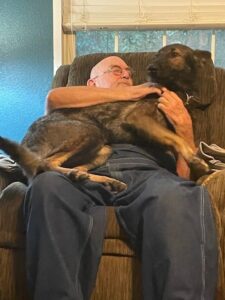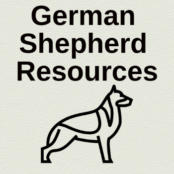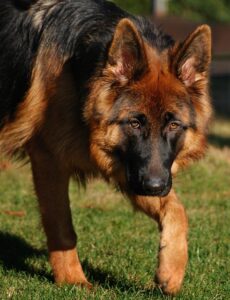Owning a German Shepherd comes with a world of joy, but it can also present unique challenges. One of the most concerning issues for German Shepherd owners is reactivity. This behavior can manifest in various ways, from excessive barking to aggressive postures, and understanding German shepherd reactivity causes is essential for ensuring a happy, balanced life for both you and your furry friend.
Table of Contents
My Personal Experience with German Shepherd Reactivity
When I brought my German Shepherd Puppy Jasper, home I though I was prepared. I had researched the breed, carefully picked a breeder, studied training methods and made plans for classes for Jasper. What I wasn’t prepared for was that Jasper would be a reactive dog.
Jasper was and is one of the sweetest, goofiest dogs I’ve ever had. He has never met a person he did not like but dogs were another matter entirely. My suspicion is part of what caused this was a class I took him to with every good intention, in which he was one of three dogs all of whom spent the class barking at each other. I should of left the class, but what did I now? Not much at that time.
I had visions of taking Jasper to dog classes and getting involved in the “dog community” which it turns out is not particularly welcoming or helpful with reactive dogs. No judgment intended, just a fact, in my case at any rate. You will likely be told it is a training issue and the various dog sport have to cater to the average and are not prepared deal with or help you with a reactive dog. If you are lucky you will get directed to a trainer who can help you, but be careful. The first trainer I went to hit Jasper with a shoe. He was pretty out of control and frankly I wanted to hit him with a shoe too, but that is not good training and it simply does not work. Thankfully, I knew enough to recognize that and had a good breeder who helped me find someone else.
What worked for Jasper and me was a private trainer who worked in dog bite sports. Turns out being reactive in dog bite sports is fairly common because of the breeds of dogs that tend to excel in bite sports. My trainer had no problem bring Jasper under control and teaching me how to do the same.
I can now take Jasper anywhere, confident that he will not “act” on his reactivity because he know I am in control and I will stop any dog or person trying to invade his space.

Understanding Reactivity in German Shepherds
What is Reactivity in Dogs?
Reactivity refers to exaggerated responses to stimuli that trigger fear, anxiety, or excitement. This can include barking, lunging, or growling, which can be particularly alarming when exhibited by a strong, large breed like a German Shepherd.
The Importance of Understanding German Shepherd Reactivity Causes
Knowing why your German Shepherd is reactive is crucial for effectively addressing these behaviors. By understanding the underlying causes, you can implement strategies to manage and reduce reactivity, ensuring a safer and more enjoyable environment for everyone involved.
Common German Shepherd Reactivity Causes
Genetic Predisposition
Breed Characteristics
German Shepherds are known for their intelligence, loyalty, and protective instincts. These traits, while beneficial in many situations, can also contribute to reactivity. The breed’s natural alertness and sensitivity to their environment can make them more prone to overreaction.
Hereditary Factors
Like all dogs, German Shepherds inherit certain behavioral tendencies from their parents. If a puppy’s parents were reactive, there’s a higher chance that the puppy will exhibit similar behaviors. Genetics play a significant role in shaping a dog’s temperament and reactivity levels. In Jasper’s case he came from working line lineage. I went this route not because I ever planned to do bite sports which i did not even know existed, but because American German Shepherd show lines have notoriously bad health.
Jasper My GSD

Jasper Cech bloodline was bred for work not show and had much better health. Along with that comes a higher drive and the chance to have issues with reactivity. This is not a fault in the breeding, rather it is what this line was bred for. Jasper was just being what his ancestry and a few unfortunate experiences with the dog community, who for the most part are great people who love dogs, made him.
That did unfortunately, leave me with an issue I was unprepared for and not much help available since most dog communities have no idea what to do with a reactive dog except tell you to go away and not come back. Again, there was no malice intended, they just had an accountability to the average dog in their class or program. That did not make me feel any less alone and alienated from the very community I hoped to be a part of.
Ironically, while Jasper was too much for most dog sport venues, he was really just a medium drive dog and not likely to do well at bite sports either. Alas, we are still looking for our place in the dog world!
Lack of Socialization
Critical Periods in Puppy Development
Socialization is crucial during the first few months of a puppy’s life. During this period, exposing your German Shepherd to different people, animals, and environments can help them develop into well-adjusted adults. Insufficient socialization can lead to fear and mistrust, which can manifest as reactivity. Just keep in mind exposure does not mean you let every person and dog directly interact with your dog. Your goal with your GSD should be neutrality. A dog that does not react or necessarily try to interact.
Consequences of Insufficient Exposure
Dogs that haven’t been adequately socialized may find everyday situations overwhelming. This lack of exposure can cause them to react aggressively or fearfully to new experiences, making it challenging to manage their behavior.
The Conundrum
In Jasper’s case, it was my attempt to socialize him in dog classes that I believe ultimately triggered his reactivity. What’s an inexperienced new owner of a German Shepherd puppy to do? Well, for one, it the class is making your puppy more reactive stop the class. For another don’t look for help with your problem from trainers that work primarily with breeds who just are not genetically prone to reactivity.
Past Traumatic Experiences
Negative Encounters with People or Other Animals
If your German Shepherd has had negative experiences with people or other animals, they may become reactive as a defense mechanism. Traumatic encounters can leave lasting impressions, causing dogs to be wary and on edge in similar situations.
Impact on Future Behavior
Trauma significantly impacts a dog’s future behavior. Understanding and addressing these experiences is crucial for helping your German Shepherd overcome their reactivity and build positive associations.
Fear and Anxiety
Common Fear Triggers
German Shepherds can develop fears of specific triggers such as loud noises, unfamiliar people, or new environments. Identifying these triggers can help you manage your dog’s reactivity more effectively.
Anxiety-Induced Reactivity
Anxiety is a common cause of reactivity in dogs. An anxious German Shepherd may exhibit heightened vigilance and overreact to perceived threats. Addressing the root causes of anxiety can significantly reduce reactive behaviors.
Owner Anxiety
While we are on the topic of anxiety, owner anxiety is also an issue and a self-fulfilling prophesy. I was very anxious around other dogs after Jasper’s first twist off that landed me on my face but luckily caused no harm to the other persons dog.
I didn’t want him to hurt anyone’s dog and I didn’t particularly enjoy landing on my face when Jasper took off with me attached to the leash. What a difference being given the tools to manage Jasper gave us both. He’s happier and I am less likely to end up with broken bones.
Environmental Triggers for German Shepherd Reactivity
Unfamiliar People or Animals
Strangers Approaching
German Shepherds may react defensively when unfamiliar people approach them or their territory. This reactivity is often rooted in the breed’s protective instincts.
Encountering Other Dogs
Meeting other dogs can be a trigger for reactivity, especially if your German Shepherd hasn’t had positive social experiences. Controlled socialization can help mitigate these reactions over time.
Loud Noises or Sudden Movements
Thunderstorms, Fireworks, or Construction Sounds
Loud noises, such as thunderstorms or fireworks, can startle dogs and cause reactive behaviors. Providing a safe, quiet space during such events can help reduce anxiety and reactivity.
Quick Movements in Their Peripheral Vision
Sudden movements can trigger a startle response in German Shepherds, leading to reactivity. Training your dog to remain calm in these situations can help manage their responses.
Territory Invasion
Perceived Threats to Home or Property
German Shepherds are territorial by nature. They may become reactive if they perceive a threat to their home or family. Managing their environment and providing clear boundaries can reduce such reactions.
Reactions to Visitors or Passersby
Visitors and passersby can trigger reactive behaviors in German Shepherds. Gradual desensitization and positive reinforcement can help your dog remain calm in these situations.
On-Leash Frustration
Leash Restraint Leading to Heightened Reactions
Being on a leash can sometimes prevent a dog from behaving naturally, leading to frustration and reactivity. This is often called leash reactivity. What I noticed with jasper is off leash another dog did not seem to trigger him.
Ensuring your German Shepherd gets sufficient off-leash exercise can help alleviate this issue.
Barrier Frustration
Physical barriers, such as fences or windows, can cause frustration for a German Shepherd, especially if they see something they want to investigate. Training and environmental management can reduce this type of reactivity.
Physiological Factors Contributing to Reactivity
Pain or Discomfort
Underlying Health Issues
Health problems can cause pain and discomfort, leading to reactive behaviors. Regular check-ups with your vet can help identify and address any underlying health issues contributing to reactivity.
Age-Related Problems
Older German Shepherds might develop health issues like arthritis, which can cause pain and result in reactive behaviors. Providing appropriate medical care and comfort is essential for managing reactivity in older dogs.
Hormonal Imbalances
Thyroid Dysfunction
Thyroid issues can impact a dog’s behavior, causing them to become more reactive. If you suspect hormonal imbalances, consult your vet for appropriate testing and treatment.
Spaying or Neutering
Spaying and neutering can help reduce hormonal imbalances and decrease reactivity in German Shepherds. It is important to consult with a veterinarian about the best timing for this procedure. It’s not recommended before age two as it interferes with growth.
Environmental Factors that Can Affect Reactivity
Noise Sensitivity
German Shepherds, like many other breeds, can become reactive due to noise sensitivity. Proper training and desensitization techniques can help your dog cope with loud noises.
Lack of Socialization
Insufficient exposure to different people, animals, and environments during their critical socialization period as puppies can lead to fear and reactivity in German Shepherds. Proper socialization at a young age is crucial for preventing reactivity later in life.
Traumatic Experiences
Experiencing trauma, such as an attack or abuse, can cause a German Shepherd to develop reactive behaviors. Working with a professional trainer and providing a safe and supportive environment can help your dog overcome their past traumas.
Impact of German Shepherd Reactivity
On the Dog’s Well-being: Stress and anxiety
Reactivity in German Shepherds can greatly impact their overall well-being. It can cause stress, anxiety, and fear, leading to health issues such as digestive problems and skin conditions. Reactivity can also limit a dog’s ability to socialize and enjoy everyday activities.
On the Owner-Dog Relationship
Reactivity in German Shepherds can strain the relationship between a dog and their owner. The constant need for management, training, and potential behavior modification techniques can be overwhelming for owners. It is essential for owners to seek professional help when dealing with reactivity in their dogs.
On Others Around the Dog
Uncontrolled reactive behavior in German Shepherds can put others around them at risk. Aggressive reactions can lead to physical harm, and excessive barking and lunging can create fear and discomfort for those around them. It is crucial for owners of reactive dogs to take responsibility and ensure the safety of others.
Limitations on Activities and Socialization
Reactivity can limit a dog’s ability to participate in activities and socialize with other dogs. This can lead to isolation, which can have negative effects on their mental and emotional well-being. It is important for owners to work with professionals to help their German Shepherds overcome reactivity so they can enjoy a fulfilling life.
On the Owner and Family ’s Daily Life
German Shepherd reactivity can also impact the owner and their family’s daily life. It may mean limiting activities that involve other dogs or people, which can be isolating for both the dog and their owners. Reactive behavior can also put a strain on household routines and make everyday tasks more challenging.
Challenges in Daily Life and Outings
Reactivity in German Shepherds can also pose challenges during outings and daily life activities. A reactive dog may struggle with walks, trips to the park, or even going to the vet. This can cause stress and frustration for both the owner and their dog. Seeking professional help can provide owners with strategies and techniques to manage reactivity in these situations.
Potential Legal and Safety Concerns
In extreme cases, reactivity in German Shepherds can lead to legal and safety concerns. If a reactive dog causes harm to another person or animal, the owner could face legal consequences. It is crucial for owners of reactive dogs to take necessary precautions and seek professional help to prevent any potential incidents.
Importance of Proper Training and Socialization
Proper training and socialization are essential for German Shepherds, especially those prone to reactivity. Early socialization with different people, animals, and environments can help prevent reactivity from developing in the first place. Ongoing training can also improve their response to triggers and teach them appropriate behaviors in various situations.
Addressing German Shepherd Reactivity
Working with a Certified Dog Behaviorist
Engaging the services of a certified dog behaviorist is crucial for addressing reactivity in German Shepherds. These professionals have the expertise to assess the dog’s behavior comprehensively, identify triggers, and develop a tailored behavior modification plan. Their strategies are often based on positive reinforcement techniques, which can effectively reduce reactivity while fostering a stronger bond between the owner and their dog. In addition, a behaviorist can provide essential guidance on managing real-world situations, helping owners feel more confident during outings with their dog.
Veterinary Consultation for Underlying Issues
It is essential for owners to consult a veterinarian when dealing with a reactive German Shepherd, as underlying medical issues could contribute to aggressive or fearful behavior. Conditions such as pain, neurological disorders, or hormonal imbalances may lead to heightened sensitivity or anxiety. A veterinarian can conduct a thorough examination and recommend appropriate treatments or medications if necessary. Addressing these underlying health issues not only improves the dog’s overall well-being but also enhances the effectiveness of behavioral interventions.
Desensitization and Counter Conditioning
Desensitization and counter conditioning are essential techniques for modifying reactive behaviors in German Shepherds. Desensitization involves gradually exposing the dog to their triggers at a safe distance and increasing the intensity or duration of exposure as the dog becomes more comfortable. In contrast, counter conditioning focuses on changing the dog’s emotional response to the trigger by pairing it with positive experiences, such as treats or toys. Combining these two techniques can help reduce reactivity and increase the dog’s confidence in previously anxiety-provoking situations. I did have some success with Jasper using this method but it was never solidly dependable. What I use now is solid. Jasper is happier and able to go anywhere and I am not anxious any longer.
Managing Triggers in Daily Life
Along with professional guidance and behavior modification techniques, managing triggers is crucial for addressing reactivity in German Shepherds. Owners should identify their dog’s triggers and create a plan to minimize exposure if you cannot find a trainer to help you gain solid control. This may include avoiding busy areas, keeping the dog on a leash in public, or using visual barriers such as baby gates when guests visit. It is also essential to maintain consistency in the dog’s daily routine and training methods to build trust and reduce unpredictability that may trigger reactive behavior.
Positive Reinforcement Training
Using positive reinforcement techniques, such as clicker training or reward-based training, can help modify reactive behaviors in German Shepherds. These methods focus on reinforcing desirable behaviors with rewards like treats, toys, or praise instead of punishing undesirable behaviors. Positive reinforcement not only strengthens the bond between owner and dog but also encourages the dog to repeat desirable behaviors in the future. This approach can be highly effective in reducing reactivity and improving overall behavior.
Exercise and Mental Stimulation
Keeping a German Shepherd physically active is crucial for their health, but it also plays a significant role in managing reactive behavior. Regular exercise helps release pent-up energy, reduces stress levels, and promotes calmness in dogs. Along with physical exercise, mental stimulation through activities like puzzle toys or training games can also provide an outlet for excess energy and help keep the dog’s mind engaged. A tired and mentally stimulated dog is less likely to react negatively to triggers.
What Worked for Jasper and Me
Frist let me say, German Shepherd and other powerful guard breeds are a big responsibility and you need to really consider weather these breeds are for you. As much as I though I was ready the dog reactivity was a challenge. Until I found my present trainer I felt overwhelmed and isolated. I was just not strong enough to control an 80 pound dog with any collar out there. It also seemed much more unkind to use a collar than to use what ultimately worked which is an E-collar.
Jasper does not need stim anymore, his collar is set to a sound and that’s enough now. It was NOT enough in the beginning but he’s very smart and learned quickly. This is a technique you must be trained in. The collar is never punishment. It is direction. As controversial as E-collars are in dog circles, without it Jasper’s life would have been much less full.
I might have stopped training with just a pet under good control with no more fears he might hurt another dog. Thankfully, he always liked people. Had I chose to do that it would have been fine. He would have been a fine pet dogs able to enjoy any activity I wanted to do. But Jasper’s linage is a working dog line and he’s happiest working so I’ve been training him with an eye towards a title in that sport. Jasper’s reactivity was never an unsolvable problem for this group of dog folks. It was just misdirected energy that needed an outlet in a sport he could excel at. And it is a sport. Jasper is just as sweet and goofy as he was before training. He has no idea he’s doing a “bite sport” It’s a game. One he enjoys greatly and will probably be good enough at to title at least once. He’s much less likely to ever bite anyone or any dog than he was before training.
Conclusion
Reactivity in German Shepherds can be caused by various physiological and environmental factors. As responsible dog owners, it is important to be aware of these factors and take appropriate measures to address them. Consulting with a veterinarian and working with a professional trainer can greatly help in managing and reducing reactivity in your beloved furry friend. With proper care and understanding, you can help your German Shepherd live a happy and well-adjusted life. So, it is crucial to pay attention to your dog’s behavior and address any reactivity issues early on to ensure a harmonious relationship with your loving companion. Remember, every dog is different, so patience, consistency, and positive reinforcement are key in effectively managing reactivity in German Shepherds. Now go give your furry friend some extra love and care! Happy training!

